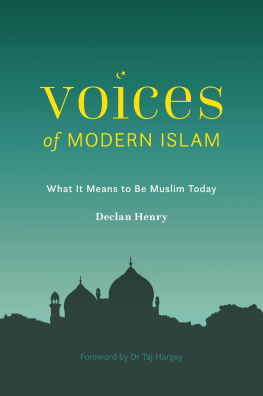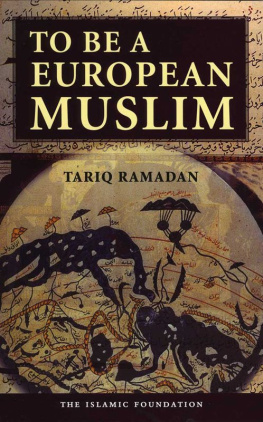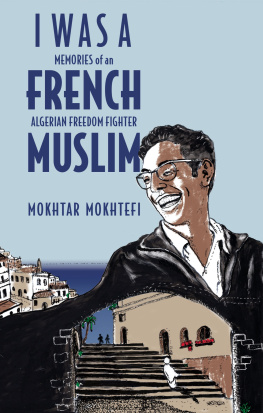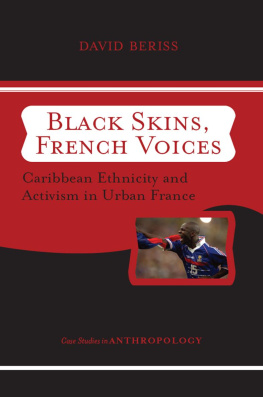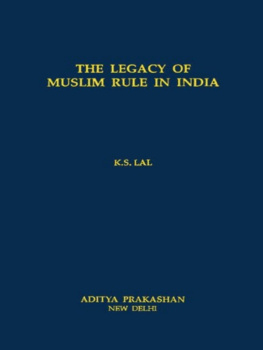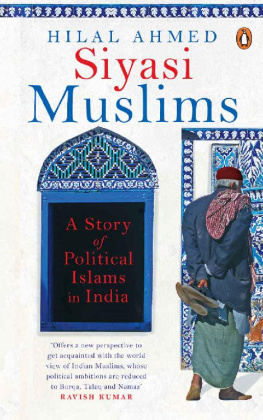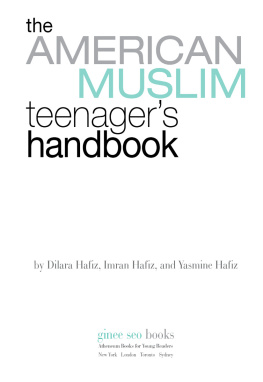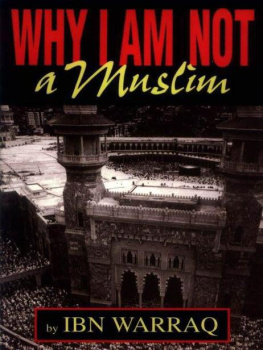FRENCH AND FRANCOPHONE STUDIES
French Muslims
Series Editors
Hanna Diamond (University of Bath)
Claire Gorrara (Cardiff University)
Editorial Board
Ronan le Coadic (Universit Rennes 2)
Nicola Cooper (Swansea University)
Didier Francfort (Universit Nancy 2)
Sharif Gemie (University of Glamorgan)
H. R. Kedward (Sussex University)
Margaret A. Majumdar (University of Portsmouth)
Nicholas Parsons (Cardiff University)
Max Silverman (University of Leeds)
French Muslims
New Voices in Contemporary France
Sharif Gemie
Sharif Gemie, 2010
All rights reserved. No part of this book may be reproduced in any material form (including photocopying or storing it in any medium by electronic means and whether or not transiently or incidentally to some other use of this publication) without the written permission of the copyright owner except in accordance with the provisions of the Copyright, Designs and Patents Act 1988 or under the terms of a licence issued by the Copyright Licensing Agency Ltd, Saffron House, 610 Kirby Street, London, EC1N 8TS. Applications for the copyright owners written permission to reproduce any part of this publication should be addressed to the University of Wales Press, 10 Columbus Walk, Brigantine Place, Cardiff, CF10 4UP.
www.uwp.co.uk
British Library Cataloguing-in-Publication Data
A catalogue record for this book is available from the British Library.
ISBN: 9780708323205
e-ISBN 978-1-78316-597-1
The right of Sharif Gemie to be identified as author of this work has been asserted by him in accordance with sections 77, 78 and 79 of the Copyright, Designs and Patents Act 1988.
The publisher has no responsibility for the persistence or accuracy of URLs for any external or third-party internet websites referred to in this book, and does not guarantee that any content on such websites is, or will remain, accurate or appropriate.
Cover image: Clifford Hayes.
__________________
This series showcases the work of new and established scholars working within the fields of French and francophone studies. It publishes introductory texts aimed at a student readership, as well as research-orientated monographs at the cutting edge of their discipline area. The series aims to highlight shifting patterns of research in French and francophone studies, to re-evaluate traditional representations of French and francophone identities and to encourage the exchange of ideas and perspectives across a wide range of discipline areas. The emphasis throughout the series will be on the ways in which French and francophone communities across the world are evolving into the twenty-first century.
Hanna Diamond and Claire Gorrara
__________________
This is my fifth book. It would be nice to say that I find that theyre getting easier; this has not been the case, and this work in particular has led me to analyse some new and difficult issues. However, I have truly enjoyed writing this book, and I hope that alongside the polemics and political passion that this book considers, this work will inspire readers to share my interest in these topics.
At various points I have called on friends and colleagues to help, advise, guide and even warn me about my many draft versions of this book. In no particular order, Id like to thank, Paul Chambers, Ruth Kinna, Anthony Fiscella, Penny Richards, Brian Ireland, Laure Humbert, Gavin Edwards, Chris Meredith, Tom Cahill, Ali Wardak, Mona al- Honi and Louise Rees for assistance with particular awkward points; Sarah Lewis, the commissioning editor for University of Wales Press, for her encouragement and, in particular, for her invaluable assistance during a difficult moment in January 2008. And also Patricia Clark, for so much.
__________________
CCMTF | Comit de coordination des musulmans turcs de France: Coordinating Committee of Turkish Muslims of France. |
CFCM | Conseil franais du Culte Musulman: French Council of the Muslim Faith. See . |
CFDT | Confdration Franaise Dmocratique du Travail: Democratic French Confederation of Labour. Created in 1964, it is now the largest trade union federation in France. Normally seen as moderate left. |
CGT | Confdration gnrale du travail: General Confederation of Labour, created in 1895. The second largest trade union confederation in France, normally seen as left-wing. |
CRCM | Conseil Regional du Culte Musulman: Regional Council of the Muslim Faith. There are twenty-five regional councils, all forming part of the CFCM. |
EPT | Une cole pour tou-te-s: A School for Everyone (with the French title specifying all girls and all boys). Organization formed to protest against the proposed law on religious symbols in schools in February 2004. See . |
FNMF | Fdration Nationale des Musulmans de France: National Federation of Muslims of France, Moroccan linked Muslim organization, created in 1985 in opposition to the grande mosque. |
FSU | Fdration syndicale unitaire: United Syndical Federation. Founded in 1993, the FSU is the largest union of secondary school teachers. |
LDH | Full title: Ligue franaise pour la dfense des droits de lhomme et du citoyen, normally shortened to Ligue des Droits de lhomme: League of the Rights of Man. Founded in 1898, during the Dreyfus Affair, and dedicated to the defence of Human Rights. Often seen as a left-of-centre organization. |
MIR | Mouvement des Indignes de la Rpublique: Movement of the Natives of the Republic. Radical, anti-colonialist movement, created in 2004. See . |
MRAP | Mouvement contre le racisme et pour lamiti entre les peuples: Movement against Racism and for Friendship between Peoples, created in 1949. Left-wing anti-racist organization. |
UOIF | Union des Organisation Islamiques de France: Union of Islamic Organizations of France, founded in 1983. See . |
We dont need people like you!
And do you think that I need you?
No, no, no. You and your veil, you can go back home!
But this is my home.
Your home? Youll never be at home here!
Is that so? What makes you more French than me?
The veil, its not French! This is a Republic! Watch out! Ive warned you!
Street confrontation, Lille, c.20067
__________________
We loved you so much.
Houria Bouteldja, 2005
There were times when I could not stop myself from admiring Jacques Chirac. As president of the French Republic, he seemed to incarnate the dignity of statesmanship in a manner that left his contemporary, Tony Blair, looking amateurish. One of these moments occurred in September 2003. Readers may remember the extraordinary heatwave which swept across Europe during that summer, stifling dozens of old, frail people in many cities. In Paris, as elsewhere, there were tragic cases in which, days after their death, lonely anonymous corpses were found in cheap apartments, under bridges and in wastelands, the last remains of tramps, alcoholics and down-and-outs. Often no one came forward to claim them, despite the best efforts of the Parisian authorities to identify them and to locate relatives. Finally, in September 2003, a decision was taken to bury these wretched, lost victims, with the municipality arranging the procedures. At that moment, Chirac stepped in. He chose to attend these funerals, for even a dead tramp was a citizen of the Republic. Chiracs presence embodied a type of trans-political solidarity that transcended social, cultural and political divisions. This incident may have been the last occasion on which the values of French Republicanism were successfully presented as embodying ideals of social inclusion.


